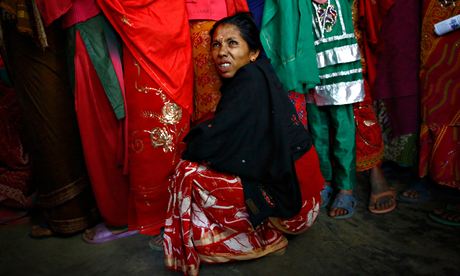
Ram Kumari Yadav was 14 when her womb started to slip out of her body. She was married before she began menstruating and had just given birth to her first child.
"My mother said: 'It's OK, it will go back inside. It happens after delivery'," she recalls from her mud-walled home in Siraha district, about 300km south-east of Nepal's capital, Kathmandu. "But when I came back to my husband's house and started doing hard work it got bigger and bigger."
Yadav is one of the hundreds of thousands of Nepalese women suffering from uterine prolapse, a condition where the womb drops into the vagina and, in severe cases, slides out of the body. The disorder is more common among older, post-menopausal women, but the UN estimates that in some regions of Nepal almost half of those with the condition develop it before they turn 30.
A new generation risk developing uterine prolapse because many women marry and have children at a young age. Traditionally, Nepalese women are expected to have several children, and continue strenuous work throughout pregnancy and soon after childbirth. The use of unskilled birth attendants may also be contributing to the rise of the condition, particularly if they do not have the expertise to repair any tears after delivery.
Yadav remembers her in-laws making her do all sorts of heavy lifting throughout her pregnancy, such as harvesting crops, gathering wood and hauling water. "My mother-in-law was very strict. She ordered me to do all of this work, and if I could not she used to beat me." Yadav says she was given just 11 days' rest after childbirth.
Thirty years later, Yadav is a mother of five – and her womb still protrudes from her body. Of the four stages of prolapse, she has stage three.
The government says 6% of women of reproductive age, about 600,000 people, are affected, but it concedes the proportion could be much higher. In one study on the eastern district of Saptari, the condition was found to affect 42% of women.
Samita Pradhan, a women's rights advocate who has been working with prolapse sufferers for more than a decade, says many people hide the condition because of the stigma attached to it. Women are sometimes ostracised by their communities and abandoned by their husbands because of symptoms such as urine leakage and bleeding.
"They are very scared to speak about this problem," says Pradhan from the Women's Reproductive Rights Programme, which has been campaigning on the issue of uterine prolapse since 1999. "They feel they won't be looked after." Pradhan says she knew one woman who felt so desperate she tried to remove her womb herself, and later died from the wound.
Pradhan says the condition should not be thought of as simply a health problem – it also as a human rights issue. She says its high prevalence is the result of widespread gender discrimination, as women do not have control over their health or their lives. Her view is backed by a recent report from Amnesty International, which calls on the government to act. Pradhan says: "They [women] can't say, 'I don't want to get married at the moment', or 'I want to go to school', or 'I don't want to work continuously', or 'I want to take a rest'. That's how Nepalese girls grow up."
Pradhan is urging the government to develop a comprehensive plan to tackle the underlying causes of prolapse – child marriage, not enough maternity leave, and a lack of girls' education.
In 2008, a local legal advocacy organisation, Pro Public, took the prolapse issue to the supreme court. The judges ruled that women's constitutional right to reproductive health had been violated because the government had failed to reduce the prevalence of uterine prolapse.
As a result, the government set up temporary camps to give free hysterectomies to women in need. So far about 50,000 women have had their wombs removed. But the camps have recently come under criticism for rushed, poor-quality surgeries and the government has axed the programme. Operations now take place in approved clinics, with stricter controls.
Women's advocacy groups have been critical of the government's response, saying it relies too much on surgery and not enough on prevention. The government disagrees. "We have already done so much," says Dr Kiran Regmi, head of family health at the health ministry. "Institution delivery, skilled birth attendants, family planning, so many things to prevent prolapse."
She says the government is expanding treatment options. It plans to begin distributing 10,000 silicone pessary rings in July, which are inserted to support the uterus, providing an alternative to surgery.
Yadav has not been able to have surgery. Her husband will not let her. She thinks it is because he does not want to suspend sexual relations while she recovers. "My whole body hurts," she says. "All the time I think, why did it come out, why do I have this problem?"
Magally Zelaya and Ian Bickis travelled with Amnesty International

